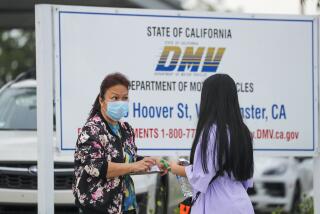Found! A U.S. government service that really works

- Share via
In these days when it seems like the current administration couldn’t organize a utensil drawer, what with a military parade witnessed by empty bleachers and immigrant dragnets snaring American citizens and such, it seems like it would be a shock to find a government function that, you know, actually works.
I found it.
On June 14, I applied to renew my passport, bracing for months of frustration with bureaucratic apathy and torpor. The State Department website that took my application warned that the turnaround time was four to six weeks, which I figured would be the minimum wait.
This must seriously be the most efficiently run government office that exists.
— Public praise on Reddit for online passport renewal
Yet I received my new passport by mail on June 28, or a crisp 14 days later. If you can think of another government service that can perform its task in two weeks from application to consummation, let me know.
This was nothing like the old system, which Ben Cohen of the Wall Street Journal described as: “Fill out a paper form. Attach a check or money order. Get photos printed — and hope they don’t get rejected. Then schlep to the post office, mail back the old passport and wait too long for a new one.”
Get the latest from Michael Hiltzik
Commentary on economics and more from a Pulitzer Prize winner.
You may occasionally receive promotional content from the Los Angeles Times.
The State Department launched its online passport renewal portal in September, after years of seeking a solution to a tsunami of passport applications. One pilot project went disastrously awry — increasing the time needed to process the paperwork.
Eventually all the glitches were ironed out, and the result has been a spectacular success. In terms of customer service, it certainly ranks as one of the triumphs of the Biden administration.
Leading the hundreds of workers who implemented the scheme were Luis Coronado, chief information officer for the State Department’s Bureau of Consular Affairs, and Matthew Pierce, then the managing director for passport services.
Their accomplishment earned them Service to America medals from the Partnership for Public Service, which honor “outstanding public servants who improve our lives.”
Said Robert Thomas, principal deputy assistant secretary of consular affairs at State, in the award certification, “Luis and Matt led the transformation of a seriously outdated government service into a leading government service that’s oriented around the customer.”
Trump tours Florida’s new detention camp as ICE continues to harass brown-skinned workers and onlookers in California.
They did more than that. They struck a blow on behalf of all the public servants who remain invisible and unappreciated when they do their jobs right, but get held up to public vituperation when something goes wrong on their watch.
Ministerial functions like car registration and Medicare enrollment and, sure, passport issuance always take the brunt of grousing about the government being so ineffectual. The public has been groomed to think that when you’ve fallen among government bureaucrats you’re hopelessly trapped in an infinite loop.
This notion was retailed by Ronald Reagan, with his quip about “the nine most terrifying words in the English language: ‘I’m from the government, and I’m here to help.’”
Particularly baroque screw-ups generally make it into the media, but for the most part these things don’t get screwed up. For the record: I’ve also had trouble-free experience with the California DMV, even on the one occasion when I had to go in person to get my Real ID. And when I’m due a tax refund, it gets paid.
The public image persists of government offices being filled with drones sitting with their foreheads on their desks. Accordingly, on the subreddit where people have been posting their passport renewal timelines — 14 days, 10 days or even less, the tone of the threads is a sort of delighted stupefaction, like someone suddenly blessed with a great stroke of luck.
“This must seriously be the most efficiently run government office that exists,” wrote one Redditor who submitted her application on July 10 and had her passport in hand on July 16.
That was my reaction too. For me the process began on June 10, when I received an email advising that my passport would expire in less than one year and therefore I was eligible for online renewal to obtain a new passport with the customary 10-year term.
“Act Now — Renew your U.S. Passport!” was the subject line, prompting me to check to make sure the message wasn’t spam. But it had been sent from a state.gov address.
After tracking down my passport and determining that State had the expiration date just right, I checked the eligibility requirements for the online service — older than 25; not planning to change my name, sex, date of birth, or place of birth; not planning to travel within six weeks (the moment a renewal application is submitted, the old passport is invalidated); and have a credit or debit card to pay the fee ($130 for the passport, another $30 for a wallet-sized ID card).
Then it was on to the nearest CVS for a digital photo, which I submitted online with the application. I received an instant acknowledgment, and emails when my credit card was successfully charged, which started the approval process; when my application was approved; and when the passport was shipped by U.S. Mail, tracking number included. Delivery even came a couple of days earlier than State’s initial projection.
Passports that have expired within the last five years can also be renewed online. First-time applicants or those with long-expired passports have to do things the old way, filling out paper forms and dropping them off, along with photos and proof of citizenship, such as a birth certificate, at an official site like a post office or city hall.
Hiltzik: Inside the Bakersfield raids that showed how Trump’s immigration policies will sow chaos
The U.S. Border Patrol ran rampant through Bakersfield in what immigration advocates say was nothing but racial profiling aimed at intimidation. More such raids are coming.
Some people may be tempted to see online renewal as just another service tailor-made for the upper crust, because who else needs a passport for foreign travel? The truth is that about 56% of adult Americans hold passports — 170 million are in circulation, according to the American Communities Project at Michigan State University. Demand is demographically and culturally diverse. Within Latino communities, the figure is 53%.
That’s “higher than one might imagine ... considering their lower incomes and college degrees and often their more rural nature,” reported Dante Chinni, the project director.
But those communities also have “large populations that have reason to travel — newer immigrants who have family and friends back in their home countries,” Chinni wrote in March. “While international travel is a luxury in some community types, in the Hispanic Centers it is more likely to be seen as part of life.”
The passport bureau has been processing as many as 25 million applications a year, up from 3 million annually in the 1970s. Under that onslaught, the consular bureau says, “applicants were facing months-long waits to get their passports. It was clear the system could not keep up.”
Given the success of the online renewal system, it’s only natural to ask: What could go wrong?
The consular affairs bureau doesn’t seem to have been hit hard by DOGEism at State, or at least not as notably as programs such as USAID. That almost feels lucky, given the obvious nexus between passport issuance and immigration and citizenship, two issues with which the Trump White House is obsessed.
Notwithstanding the success of Coronado and Pierce at modernizing the passport system’s technology, the process is still very much human-powered: More than 1,200 passport specialists are charged with reviewing applications. That’s a decline of about 15% over the last couple of years. Their union representatives say the bureau is understaffed, and things are only going to get worse as the bureau experiences a years-long trend of increased caseloads.
For now, however, this is a service that really works. I haven’t seen any public complaint about an online renewal application getting swallowed up in the gears; thus far, every public comment I’ve seen for the service is praise.
Let’s hope that it lasts, and that the determined effort that brought it about can work the same magic on less efficient corners of the government. Don’t we owe that to ourselves?
More to Read
Insights
L.A. Times Insights delivers AI-generated analysis on Voices content to offer all points of view. Insights does not appear on any news articles.
Viewpoint
Perspectives
The following AI-generated content is powered by Perplexity. The Los Angeles Times editorial staff does not create or edit the content.
Ideas expressed in the piece
- The author describes experiencing unprecedentedly fast passport renewal turnaround, receiving the new document within 14 days—far quicker than the State Department’s estimated 4-6 weeks routine processing time.
- He praises the online renewal system as a “spectacular success” and “one of the triumphs of the Biden administration,” contrasting it with the outdated paper-based process that required physical forms, photo printing, and postal delays.
- The piece highlights the efficiency of government services when properly modernized, citing the passport system’s ability to handle 25 million annual applications despite past bureaucratic challenges.
- Emphasizing accessibility, the author notes passports are held by 56% of U.S. adults across diverse demographics, refuting claims that they serve only elite travelers.
Different views on the topic
- Standard passport processing times remain consistently longer than the author’s exceptional experience, with routine services taking 4–6 weeks and expedited options requiring 2–3 weeks[1][2][3], excluding mailing delays which can add up to 14 days[3].
- Seasonal demand surges, particularly from late winter through summer, extend processing durations beyond typical timelines[2], making sub-two-week turnarounds uncommon for most applicants.
- The online renewal portal excludes first-time applicants and those with passports expired over five years, who must use slower paper-based methods[4], limiting the system’s universality despite its efficiency for eligible users.
Get the latest from Michael Hiltzik
Commentary on economics and more from a Pulitzer Prize winner.
You may occasionally receive promotional content from the Los Angeles Times.













